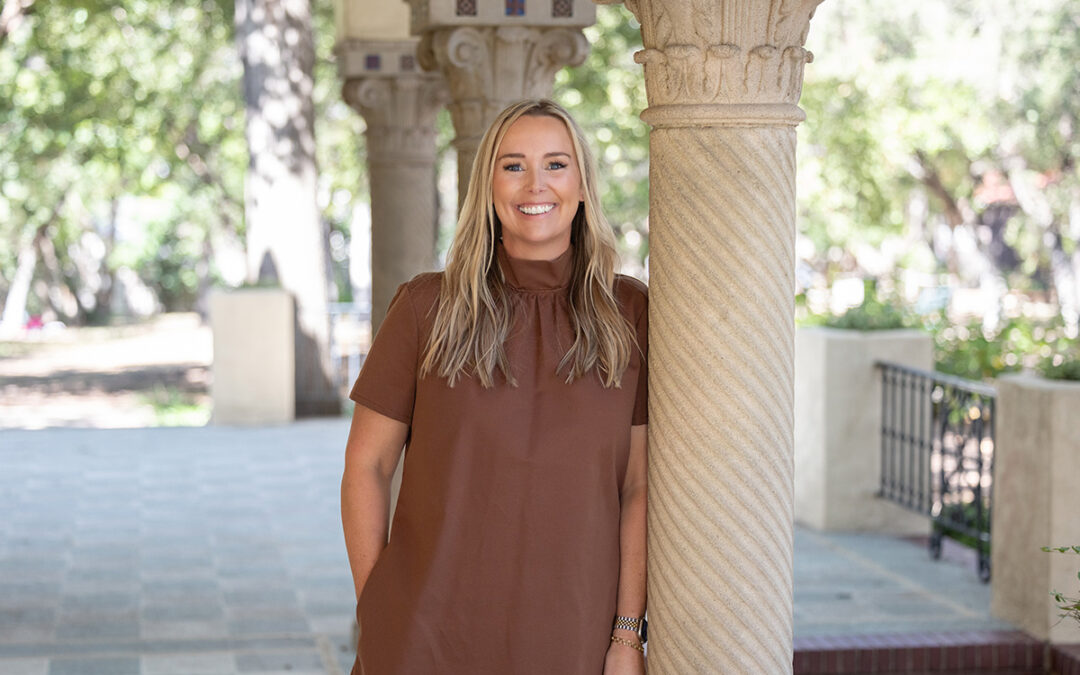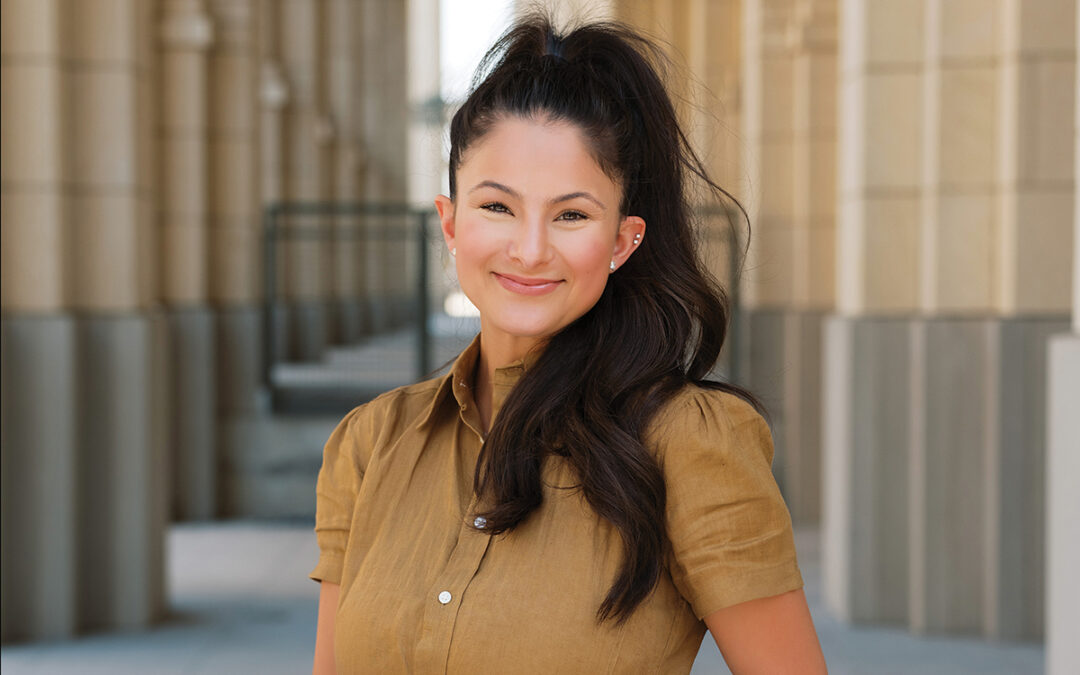EMILY STARK
Age: 30
Occupation: School counselor, Sunshine Cottage School for Deaf Children
Personal: Experienced hearing loss as a young child and now hears with the help of a cochlear implant and a hearing aid. Married to Brian Stark, who works in medical-equipment sales; they’re “pet parents” of Truffles, an Afghan hound
Why she’s a role model: As a Sunshine Cottage alumna who had a successful experience with mainstreaming from elementary through graduate school, she’s an inspiration to the students she counsels.
Her own role models: Her mother Debbie Jackson, a former teacher who used her professional skills to help her hearing-impaired daughter improve her speech, “even when I didn’t want her to”; and Angela Legarreta, social worker and family specialist at Sunshine Cottage
Goals: Starting a family, pursuing a program to become a licensed professional counselor (LPC) and establishing a private practice
Favorite relaxation strategy: Boating with her husband, “just cruising around until we’re alone together in the middle of calm waters” People would be surprised that I…”Love spending time at home – I think downtime is a valuable thing that most people need, but you have to plan to make space in your life for it.”
What she’s reading: The Five People You Meet in Heaven, a novel about the afterlife by Tuesdays with Morrie author Mitch Albom, about people who are influential in the lives of others
Not long ago, Emily Stark was standing in her kitchen when a sound she’d never heard before caught her attention. It was a ticking noise, and she spent a few anxious minutes searching before she tracked it to its source. “It was the timer on the dryer,” she says smiling. “I’d never heard it before.” To her, the utilitarian hum was a gift: Stark had undergone hearing loss in early childhood. Less than a year ago, she had surgery for a cochlear implant – an electronic device that stimulates the auditory nerves — and the change in her life has been profound.
Before the implant, she says, “I could talk on the phone with people whose voices I knew,” but it was a challenge to communicate with a less-familiar caller. With the aid of the new device, Stark picks up previously unheard sibilants and other high-pitched speech sounds. Some of her new auditory experiences are a mixed blessing: “I didn’t know you could hear birds, especially grackles, even when you’re indoors,” she says.
While she talks with a visitor, Stark is sneaking a late lunch in the otherwise empty dining room at Sunshine Cottage School for Deaf Children, where she is the school counselor. With the implant in her right ear and a hearing aid amplifying sound in her left, she hears and speaks so well that most people wouldn’t guess that she’d had a hearing loss. Though cochlear implants are controversial within the Deaf community, she says she had no hesitation about getting an implant. “My brother and I are the only members of our family with a hearing loss,” she explains, “and I haven’t been exposed to Deaf culture. I just wanted the best hearing I could get.”
Stark wasn’t always hearing-impaired. Both she and her younger brother were born hearing, she says, but by the time they were about three, each child had undergone progressive sensory neural hearing loss. “It’s probably a congenital condition,” she says, “but (doctors) still don’t know what it was or what to call it.” To help her keep and develop her speech and language-recognition skills, Stark was enrolled at Sunshine Cottage. Founded in 1947, the school uses an auditory/oral method to teach children with hearing loss to communicate. Although the school has classes for children in preschool through fifth grade, Stark attended only for her pre-K and kindergarten years. “The program worked a little differently then,” she says. After two years, Stark was judged ready to “mainstream,” transferring to public school in classes with typically hearing children at Colonial Hills Elementary and later Encino Park Elementary. Regular meetings with a mainstream/itinerant teacher from Sunshine Cottage gave her an opportunity for special work outside the regular classroom, where her teachers also helped with accommodations. Most important was an FM system in which the teacher wears a microphone, and the student wears a receiver. “At first, the other kids want to know, ‘What’s that?’ (pointing to the receiver),” she says. “Then you tell them, and they get used to it,” she says. Meanwhile, her mother Debbie Jackson, a former teacher at Bulverde Elementary School, gave her extra help at home. “She was always correcting my speech and language,” says Stark, “and she was also the one who pushed me never to give up.” With additional support from a Sunshine Cottage counselor through middle school, she became “a self-confident youngster, able to function” by the time she started high school at Castle Hills First Baptist School, where she appreciated the extra help teachers could give in smaller, private-school classes.
At Texas State University in San Marcos, Stark signed up with the university’s Office of Disabilities and received guidance on managing required courses. Once again, she was able to use an FM system in classes and could have an interpreter if needed. To make sure she didn’t miss anything in lectures, “I’d make friends with someone in class and share their notes.” As she progressed into courses in her major — Family Consumer Science with an emphasis in Child and Family Development– the classes got smaller and the discussions easier to follow. She made a point of being honest about her hearing abilities, letting her teachers know that she might have to ask them to repeat something, particularly if they spoke while writing on the board. “I had great professors,” she says. “I’d sit up front, and they could turn around and help me if I needed extra help.” Meanwhile, her personal life also was developing well. She met her future husband, Brian Stark, while she was working weekends at The Grapevine, a wine-tasting room specializing in Hill Country Wines in historic Gruene, near New Braunfels. “We called him the ‘Sunday guy,’ because he would come in only on Sundays and order a glass of wine,” she says laughing. “He was a nice guy, but he had to buy a lot of wine” (before the couple started going out). Stark was still in college, while her husband was already a New Braunfels homeowner, working in medical-equipment sales. From the beginning, he seemed different than other men she had dated. When they had their first casual conversations, “The subject of my hearing loss never came up,” she says, but when she told him, “It didn’t change our relationship.” As they got to know each other better, Stark learned to her relief that, “he was never the type to say, ‘No, never mind’ when I asked him to repeat something.”
After Stark received her undergraduate degree, she decided to stay in the area and entered a master’s program in professional counseling at Texas State, earning a 3.9 grade-point average by the time she graduated in 2005. While she had considered a teaching career and did a stint as a teacher’s aide in the university’s Child Development Center, she remembered her mother’s frustrations with public-school bureaucracy, as well as her own experience with counselors from Sunshine Cottage. “As a counselor, you work one-on-one with students and can reach out to them in so many different ways,” she says. After she completed her first internship with a San Marcos agency, Sunshine Cottage accepted her proposal to do an internship in counseling. As an intern, her work was overseen by Family Services director Lisa Lopez, who had begun as a teacher at Sunshine Cottage and had gone back to school to earn a master’s degree in counseling, and social worker Angela Legarreta. “Both have such a wealth of knowledge and had tremendous influence on me,” says Stark. When a counseling position opened up near the end of her internship, Stark was offered the job. “That was quite a blessing,” she says smiling. Since the beginning of the 2005-2006 school year, she has worked with groups and individual students, done play and art therapy and provided guidance lessons and parent education for the Sunshine Cottage community.
The work of a school counselor there is similar to other settings. “I see everything from the extremes of depression and other mental-health issues, divorce in the family, not getting along with parents and academic issues,” she says. Teachers refer students to her for concerns about poor self-esteem, behavior problems or not striving to do their best in the classroom – the same problems that come up in typical schools. There also are more issues particular to the students Stark works with: “Children need to discuss their hearing loss,” she says. As hearing-impaired students are mainstreamed – currently into Nimitz Academy middle school and Lee High School, in future to Alamo Heights Junior School and Alamo Heights High School – they must make a further adjustment. “Here, everybody understands (hearing loss),” she explains. “When you’re mainstreamed, you can feel isolated if you’re the only one. It can be embarrassing to have a hearing aid.” Students at the outset of the mainstreaming experience talk with her about their fears – being laughed at, having no friends, not finding a place in their new school. She’s able to call on her own memories to give her students coping strategies. “I tell them, ‘If they laugh, it’s because they don’t understand what it is, what it’s for. You have to educate them, tell them what it does.” Stark also advocates that her transitioning students join clubs and play sports in their new schools. “Getting involved in activities makes it easier to make friends, and it boosts self-esteem,” she says. “You have to take part, even if it’s scary at first.”
Sometimes, she says, the students she works with “need somebody to say, ‘I know what it’s like. I’ve been there.'” Sunshine Cottage students, she finds, are impressed that Stark, a former student there, could come back to the school as a deaf adult to work in a professional position there. “Even the littlest ones will point at my hearing aid, then back to theirs, to say, ‘You’ve got one, too,'” she says. Most often, the students smile when they make that connection.
Despite her professional and personal success, Stark still sometimes feels upset about her hearing loss and the complications of overcoming it: “I think, ‘Why do I have to go through this?'” As a person of faith, she says, “I believe that I was given these challenges to put me in a place where I was supposed to be – giving back to the school that started it all for me.”
For details about Sunshine Cottage School for Deaf Children, visit www.sunshinecottage.org or call (210) 824-0579.









0 Comments